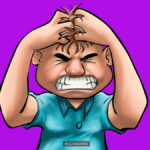Table of Contents
Growing up with controlling and critical parents can leave deep emotional scars that last long into adulthood.
The constant put-downs, lack of emotional support, and stringent rules enfeebled your self-esteem and sense of self-worth.
Even years later, you may still struggle with feelings of inadequacy, anxiety, and difficulties in relationships.
Statistics on the impact
According to a study published in the Journal of Traumatic Stress, children raised by controlling parents are more likely to develop mental health issues like depression, anxiety, and PTSD later in life. Another research by the American Psychological Association found that parental criticism is linked to lower self-esteem and higher rates of substance abuse in adulthood.
The importance of healing
Healing from this kind of childhood trauma is crucial for your overall well-being and ability to form healthy relationships. The road to recovery may be long, but regaining your sense of self-worth and breaking free from toxic patterns is possible.
Acknowledge the Pain
The first step is to validate the pain and emotional turmoil you experienced as a child. Don’t minimize or rationalize the ways your parents’ behavior affected you. Allow yourself to feel the full range of emotions – anger, sadness, shame – without judgment.

Practice Self-Compassion
You are not to blame for the way you were treated. Cultivate self-compassion by speaking to yourself with kindness and understanding, not criticism. Treat yourself as you would a close friend going through similar struggles.
Identify Negative Core Beliefs
Controlling and critical parents often instill negative core beliefs about ourselves that linger into adulthood. Identify these destructive thought patterns (e.g. “I’m not good enough,” “I can’t trust anyone”) and consciously challenge them. Replace them with more positive, realistic perspectives.
Build a Support System
Surround yourself with people who truly see and appreciate you for who you are. Seek out supportive friends, join a support group, or speak to a therapist who specializes in childhood trauma. Having a solid support system is vital for healing.

Reconnect with Your True Self
Years of criticism likely caused you to lose touch with your authentic self. Explore new hobbies, values, and interests separate from your parents’ expectations. Rediscover the activities and qualities that make you feel genuinely happy and fulfilled.
Set Boundaries with Parents
If you still have contact with your parents, it’s important to establish firm boundaries to protect your well-being. This may mean limiting communication, refusing to tolerate criticism, or even cutting ties if they remain toxic. Don’t feel guilty about prioritizing your mental health.
Letting go of the trauma inflicted by controlling and critical parents is an ongoing journey of self-discovery, self-acceptance and self-love. What small step can you take today towards reclaiming your self-worth?
FAQs on Healing from Controlling and Critical Parents
How do I know if my parents were actually controlling or just strict?
Controlling parents tends to be extremely restrictive, allowing little to no freedom or privacy. Their rules are rigid and unsupportive of your individual needs. Strict parents set high expectations but still allow room for open dialogue.
What if I still love my parents despite the trauma?
It’s possible to love your parents while also acknowledging the pain and damage caused by their behavior. Love and forgiveness don’t negate the need for boundaries and healing on your end.
Can I ever have a healthy relationship with controlling parents?
With work on both sides, it may be possible to redefine your relationship as an adult. However, this requires your parents acknowledging their problematic behavior and making substantial changes. Don’t compromise your well-being for an unchanged dynamic.
How long does it take to heal from this type of childhood trauma?
Teh healing process is unique for everyone and can take years or even decades. Be patient and compassionate with yourself. Consistent self-work and building a support system are key.
What if my parents were also victims of controlling upbringings?
While generational trauma can shed light, it doesn’t excuse or diminish the impacts on you. Focus first on your healing before exploring their past if helpful.
When is professional help recommended for dealing with this trauma?
If you’re struggling with severe emotional, mental, or behavioral issues stemming from your childhood, seeking support from a therapist experienced in trauma work can be veyr beneficial.

Useful Resources and Links
- Emotional Well-Being | CDC. This website offers tips and resources on how to improve your emotional health and resilience in different areas, such as stress, social connectedness, and coping with COVID-19.
- NIMH » Help for Mental Illnesses. This website provides guidance on how to find help for yourself or someone you know who has a mental illness, is struggling emotionally, or has concerns about their mental health.
- NIMH » Caring for Your Mental Health. This website lists federal resources that can help you improve your mental health, such as the NIH Emotional Wellness Toolkit, the NIH Social Wellness Toolkit, and MedlinePlus.
#healingchildhoodtrauma #toxicparents #overcomeemotionalabuse #mentalhealth #recovery #boundaries #selfcompassion #positiveparenting #traumarecovery #selfworth




















